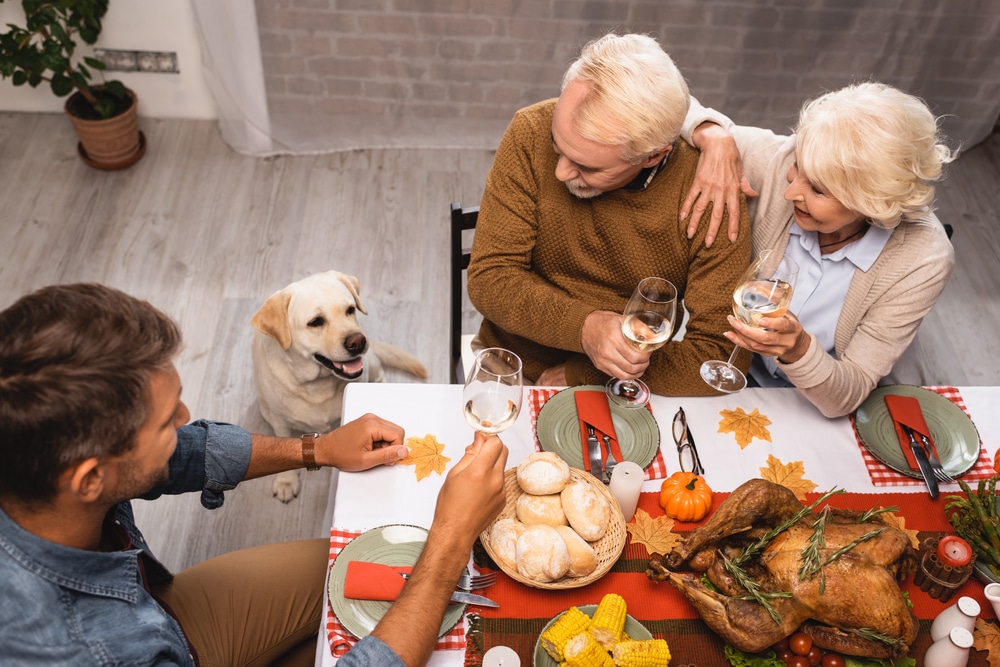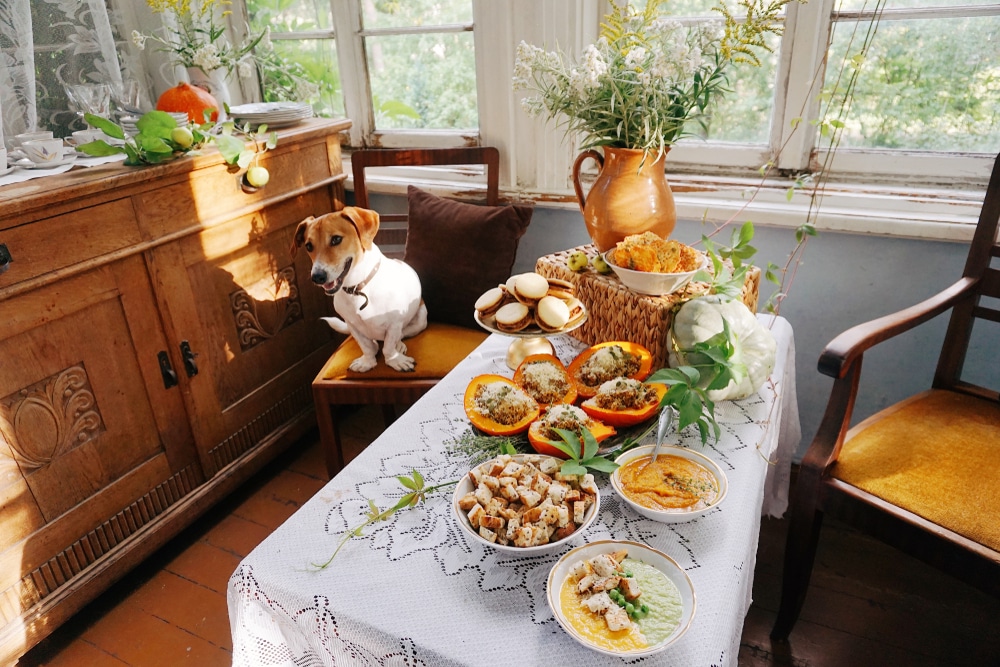As you and your family indulge in the deliciousness of a traditional Thanksgiving dinner, it’s only natural to want to share some with your furry friend! Stuffing is typically included as part of that scrumptious feast. But before serving up those stuffing-filled leftovers, can dogs actually eat stuffing?
Dogs should not eat stuffing. Stuffing contains high fat, salt, and other human ingredients like garlic and onions. Not only will these processed components lead your pup’s stomach into distress, but sage and onion stuffing specifically contain a toxic allium family member, which can be detrimental to their health. There are alternative options that are safe for dogs though, such as cooked vegetables, non-salty meats, or unseasoned chicken broth. Remember to always consult with your veterinarian prior to making any changes to your dog’s diet.
Table of Contents
What Is Stuffing?
Stuffing is a savory combination of breadcrumbs, herbs, fruits, nuts, sausage meat, and onion bound together with egg or liquid to form a semi-solid mixture called stuffing.
A classic accompaniment to roast chicken, pork, or lamb dishes, this delightful dish can take a meal from good to divine. Serve up some succulent slices of cooked meat alongside delicious stuffing for an unforgettable feast.
Although stuffing is a delicious addition to any meal, it should not be shared with your pup though. Too much fat, salt, and other human ingredients can cause gastric distress or, even worse, depending on the type of stuffing being consumed.
Is It Safe for Dogs to Consume Stuffing?

It’s best to keep stuffing away from dogs. It can contain ingredients toxic to them, such as onions, garlic, spices, and various types of nuts. Plus, the breadcrumbs that form their base often have high amounts of butter or oil, which can cause stomach discomfort. To keep your pup safe, don’t give them stuffing.
Small pieces of turkey skin and bones may be mixed in with stuffing which can create choking hazards or cause intestinal blockage if ingested. If you want to share some holiday treats with your pup, there are many safer options available such as cooked and pureed sweet potato, cooked and pureed carrots, apple slices, or even low-sodium chicken broth.
Why Is Onion Stuffing Toxic To Dogs?
Onion stuffing can be dangerous for dogs if ingested in high amounts. Thiosulphate, a compound found in onions, can disrupt the production of red blood cells and cause anemia in dogs.
Eating cooked or raw onion stuffing can lead to vomiting, diarrhea, loss of appetite, and weakness. In severe cases, it may even be fatal.
If your pup has eaten onion stuffing, contact a veterinarian immediately for treatment. Other ingredients in the stuffing, such as garlic, can also be hazardous to dogs and should be avoided. Keep onion stuffing out of reach from your pooch to ensure their safety.
Health Risks Of Stuffing For Dogs
Dog owners should be wary of the potential health risks of stuffing before allowing their furry friend to partake in a holiday feast. Here are three adverse outcomes that could arise from feeding your pup stuffing.
Constipation
Stuffing, with its high-fat content and dense texture, can cause constipation in dogs. Mixing ingredients takes longer to digest, so it’s difficult for your pup to eliminate waste.
Additionally, the bones can splinter or break inside the digestive tract or merge together, forming a blockage that leads to either constipation or, even worse, an intestinal obstruction!
Gastrointestinal Upset
Be aware that stuffing is packed with sodium and various seasonings, leading to decreased appetite, vomiting, or diarrhea in your pup. If these signs worsen or remain for longer than several days, it’s time to get advice from your veterinarian.
Keep an eye out if you suspect the onset of pancreatitis in dogs, as these are typical warning signs associated with this condition.
Toxicity
Stuffing recipes all too often contain foods that are toxic to dogs. For instance, dishes such as mashed potatoes, onion stuffing, and casseroles with leeks, chives, or scallions will cause severe toxicity in your pup’s production of red blood cells!
Store-bought stuffings could also comprise xylitol, a natural sweetener that can lead to seizures or even coma if ingested by dogs.
Can Stuffing Lead To A Dog Dying?
Stuffing can be hazardous for dogs, particularly when consumed in excess. Overindulging can cause a blockage of the gastrointestinal tract, which may lead to serious, even fatal, consequences.
Moreover, some stuffings are made from ingredients toxic to pooches, such as chocolate, raisins, garlic or onions, all of which could be fatal. Hard-to-digest ingredients may also cause intestinal issues and health problems.
Therefore, stuffing should only be offered to dogs as a treat in small amounts. When selecting stuffings for your furry friend, check the ingredients carefully to make sure there are no potentially perilous components.
If Your Pup Has Ingested Stuffing, What Should You Do?
When your pup ingests stuffing, time is of the essence. This ingestion can be life-threatening, leading to choking, intestinal obstruction, vomiting, or even death if not addressed quickly. Therefore, it’s crucial to seek medical help immediately and take the following steps:
- Remain calm and do not panic; panicking will only worsen the situation.
- Remove any visible pieces of stuffing or fabric from their mouth and check for signs of choking, such as difficulty breathing or pale gums.
- Maintain your pup’s airway by gently pulling its tongue forward and checking to ensure nothing is blocking it.
- Monitor your pup’s breathing and use a pet first aid kit to perform rescue breathing if necessary.
- Call your veterinarian or local emergency animal hospital for advice on how best to proceed. Because stuffing can lead to serious complications, it is important not to wait too long before seeking medical attention.
Alternatives To Stuffing For Dogs
If you wish to make your pup’s day special with a yummy treat, look no further! Stuffing may seem like the go-to choice for holidays or birthdays; however, be mindful that it can pose threats when ingested, potentially causing choking or intestinal blocks.
To provide your dog with an enjoyable experience while avoiding potential hazards, here are some safer alternatives.
Chicken Breast
Cooked, unseasoned chicken breasts make a great low-fat and high-protein alternative to traditional stuffing for dogs.
Peanut Butter
Not only can peanut butter be used as a tasty treat, but it’s also a healthier option than traditional stuffing ingredients.
Cheese
Low-fat cheese such as cottage or ricotta may be used to stuff toys and treats for your pup.
Applesauce
Unsweetened applesauce is a tasty alternative that adds just the right amount of sweetness without added sugar.
Oatmeal
A healthy source of carbohydrates, oatmeal can make a low-fat and nutritious stuffing for your pup’s toys.
Rice
Cooked white or brown rice is an excellent low-calorie option to stuff toys with, as it helps promote a feeling of fullness for your dog.
Boiled Eggs
Boiled eggs make a delicious treat that can also be used to stuff toys and treats.
Yogurt
Low-fat plain yogurt or Greek yogurt make delicious and healthy stuffing options for your pup’s toys. Just make sure your dog isn’t lactose intolerant first.
Pumpkin Puree
Natural pumpkin puree is a great way to add some extra flavor and nutrition to stuffed toys and treats.
Carrots
Cooked carrots are a delicious and healthy option for stuffing toys with, as they are low in fat and high in vitamins.
In Conclusion: Can Dogs Eat Stuffing?
Our beloved dogs can be negatively affected if they eat too much stuffing or the incorrect type. To ensure their safety and promote longevity, it’s essential to check what ingredients are used in the stuffing and take action before any consumption. Let’s always keep our pup’s health and safety in mind as a first priority, so it is best to avoid providing them with stuffing altogether.
If you still decide to provide them with this treat, make sure the ingredients are safe and given only in small amounts. When you have any uncertainties or inquiries about their well-being, be sure to consult your vet for advice! Together let’s ensure that our furry friends stay healthy – no stuffing included!
So, do you plan on giving your dog some dog-safe stuffing or giving them an alternative? Let us know in the comments below!
